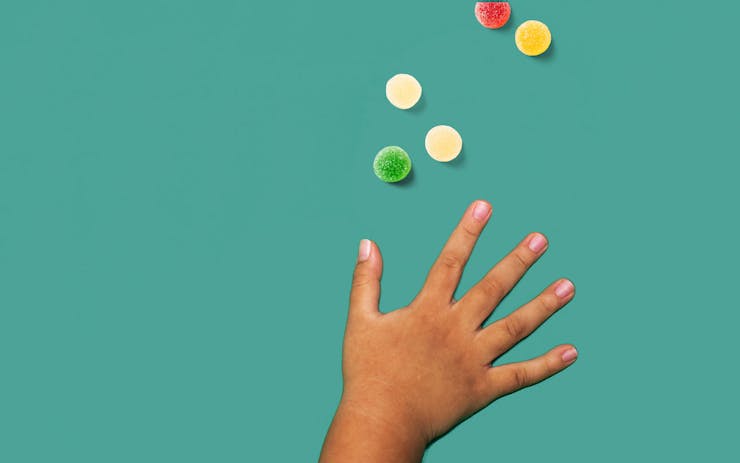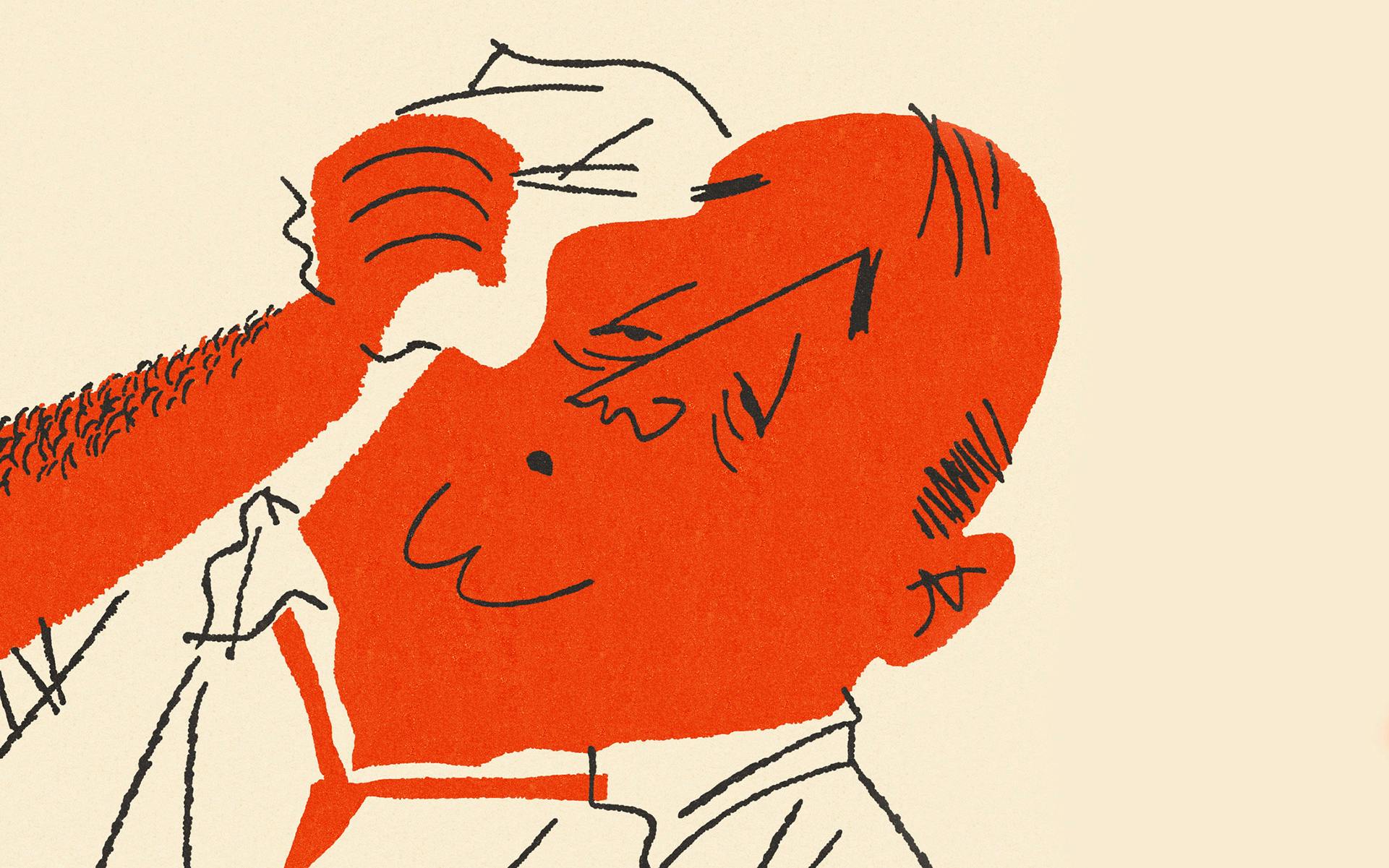When Audrey Noble* woke to the sound of rattling downstairs she knew something wasn’t right. The mother of three got out of bed, listened again, and went down to investigate. What she found made her heart drop: there on the floor was her opened purse and her three-year-old son, holding a bottle of cannabis-infused mints she had brought to a party the night before, with its contents now scattered around him.
“Mints! Candy!” she recalls him joyfully telling her as she lunged towards him in a panic. “How many did you eat??” she cried before shoving her fingers down his throat to make him vomit. It didn’t work, and only made the situation worse.
“Now he was crying and losing it,” she recalls. “And then I was like, ‘this is not okay’. So I apologized, but he was still so upset, asking me ‘why did you do that?’ through tears.”
Noble took a minute to think. She knew the mints contained 2.5 mg THC each. She also knew the container came with 30 mints in total, so she scooped them all up and counted: 18 left.
“It wasn’t a brand new bottle, so I wasn’t exactly sure how many I’d consumed,” she said. But she was confident he had eaten a handful, between three and five mints. Her next move was a flurry of phone calls.
“I had to cancel everything: my work that day, I had appointments, I had so much stuff going on. So I sat him on the couch, turned on a movie and I went about just trying to reconfigure my day because I didn’t know what I was in for.” All the while she wondered if she should bring him to the ER and have his stomach pumped.
As shocking as all this may sound, Noble is far from alone. Dr. Sam Wang, pediatric emergency medicine and toxicology expert of the Children’s Hospital Colorado, says in 2017 the hospital saw 36 patients under the age of 10 for accidental cannabis ingestion.
There are over two million calls to poison centers nationwide annually...Common household products and over-the-counter medicines represent the overwhelming majority of these calls as these are extremely commonplace to have in the home.
One of the first US states to legalize edibles, it’s no secret Colorado has seen an uptick in kids getting into edibles: a recent study states the number of children exposed to cannabis has doubled since legalization, with edibles representing about half of those exposures. And on a national scale, a two-year review of the US National Poison Data System revealed 430 calls concerning edibles, the most common age group being children five and under.
There are more common poisons in the home
To put all this into perspective, however, curious kids are getting into way more than Mom and Dad’s special brownies.
“There are over two million calls to poison centers nationwide annually. Kids less than six represent half these calls,” says Wang. “Common household products and over-the-counter medicines represent the overwhelming majority of these calls as these are extremely commonplace to have in the home.” He says while legalizing cannabis edibles increases their availability in the average home, they still aren’t as common as things like detergents, cleaners and other household items.
As Noble’s day unfolded she noticed her son looking “high” about 45 minutes after she found him on the floor with her mints. “It was like, ‘oh, there he goes’,” she says. His eyes began to droop and his words came out more slowly. “Mom…Toast” was the first thing he wanted, so she made him peanut butter toast. Then came “Mom… Juice”. For the next few hours her normally hyperactive kid was sleepy but cognisant, requesting snacks while watching movies and cuddling with Mom—a highlight that somewhat softened the guilt for Noble. “It was the worst day of my life, but in some ways the best day,” she says.
Noble ended up not taking her son to the hospital. A medical cannabis patient for many years and occasional recreational user she knew her son was buzzed, but based on the amount he consumed (somewhere between 7.5 mg to 12.5 mg THC), she felt strongly he was not in medical danger. “I just did what you would do for any friend that got too high. You give them food, you give them water, you let them lie down,” she says. “Had he eaten 450 mg of a concentrate or gotten into rosin or a distillate product, or anything like that, then yeah, that would definitely have been cause for concern.”
What the experts say
From a physician’s standpoint, Wang suggests calling poison control as a starting place for any amount of cannabis. “They can walk you through a risk assessment and initial treatment,” he advises. “If there are concerns for life-threatening symptoms, call 9-1-1. If there are any concerns or questions, seek healthcare evaluation.”
For children who are taken to hospital, they won’t necessarily have their stomachs pumped or be made to swallow activated charcoal. Wang says at Children’s Hospital Colorado they consider the time of exposure, the exact product consumed (including amount of THC per serving, etc.), and a timeline of the child’s symptoms. If, unlike Noble, you have no idea how much your child has ingested, Wang says they obtain a thorough medical history of the child, perform a physical exam, and potentially perform other diagnostic labs to help them assess the situation. “Then we determine if we can observe, or need to admit to the hospital,” he says. While there is virtually no risk of cannabis overdose in adults, he cautions children can have more severe symptoms of ataxia (difficulty balancing), sedation, and even coma and respiratory failure. “[In hospital] we make sure the blood pressure and heart rate are normal, their breathing is adequate, and observe until symptoms have resolved.”
Wang emphasizes safe storage like any other medication, alcohol or household cleaner: up and out of reach, in a locked container or cabinet, inside child-resistant packaging. Noble has followed this cannabis safety rule to the letter for years. But on that night she tossed her purse onto the counter, paid the babysitter and went straight to bed. “It was one of those bonehead moments where you leave something in your purse and don’t even think about it,” she says. Because the mints were not in a child-proof container, she says she now uses old Tylenol bottles and labels them clearly for any edibles she carries around with her.
Looking back, Noble says the worst part of that day was her initial panic that frightened her son, and then the crushing guilt that followed about the entire incident. But after a full day on the couch her little boy ate his dinner, went to bed, and woke up the next morning the same old kid. While she now shares her story freely with other parents, she feels strongly it’s a conversation that needs to take place—without all the blame and shame on parents. “Kids do stuff. They fall off stuff, they do stupid stuff. Because they don’t know,” she says.
Her parting advice for parents and caregivers who find themselves in a similar situation is to remain calm, call on someone you trust for help, and above all to keep a cool head so you don’t scare your child. “It’s no good to freak out, especially around someone who’s high,” she offers. “Get them some orange juice, get them some snacks and just be prepared to relax and chill.”
*Name has been changed.
Watch Leafly TV
Click here to discover more videos on Leafly TV.






